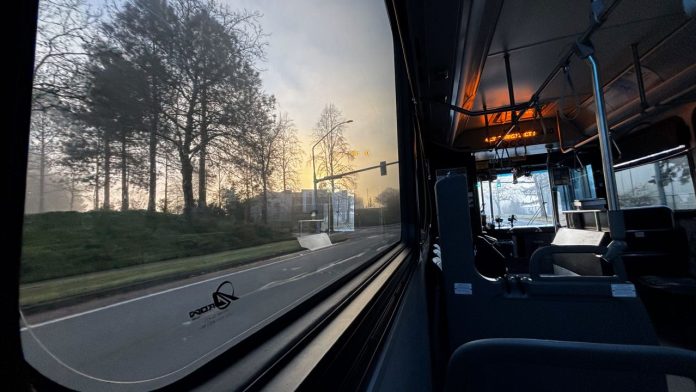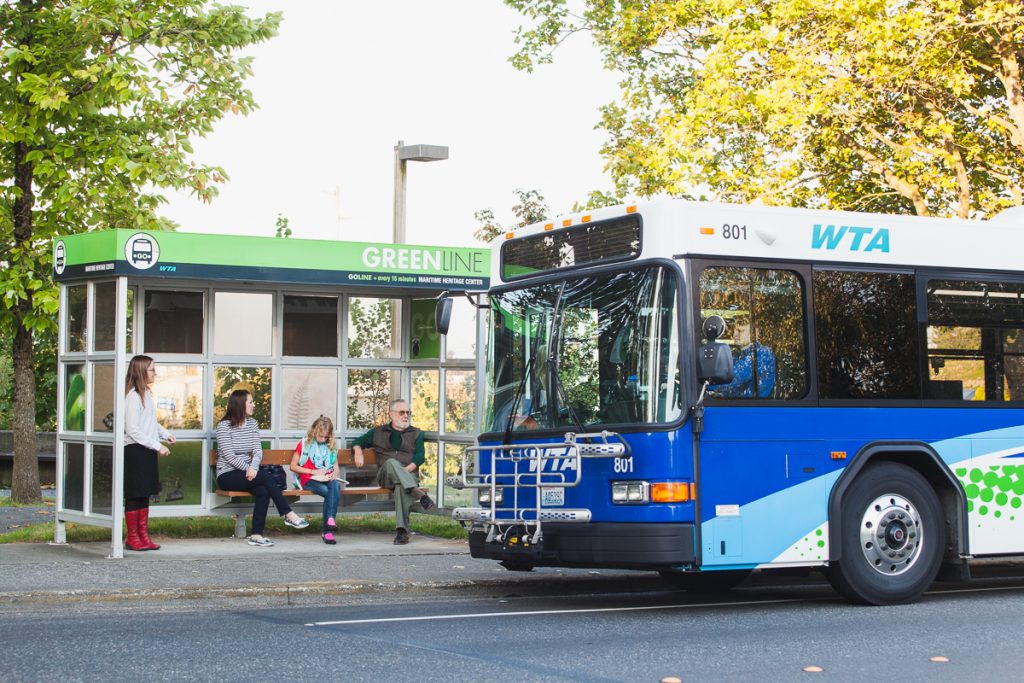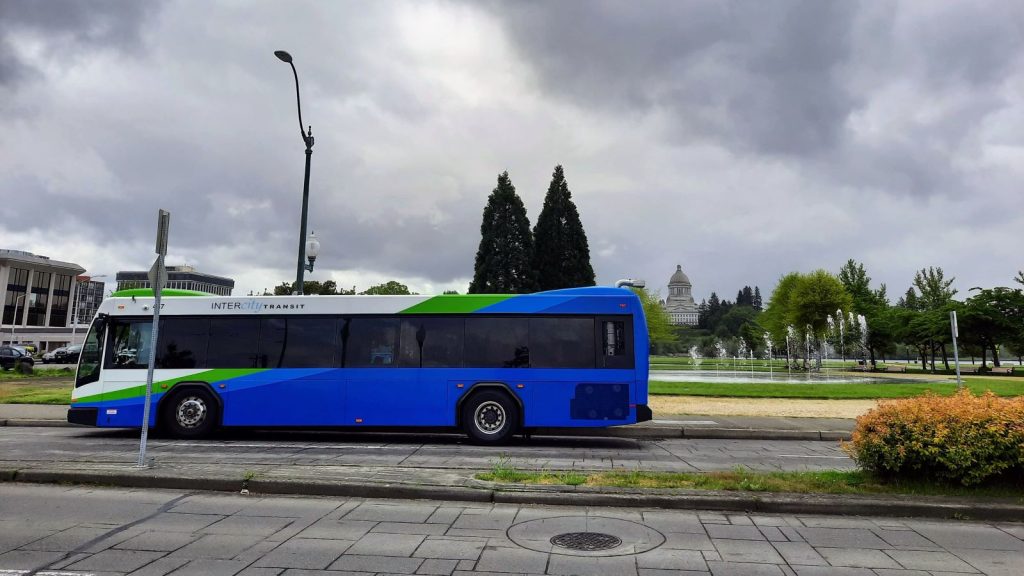
Transit advocates are gearing up to pass legislation allowing Public Transit Benefit Authority boards across the state to create voting seats for riders.
Last July, Atlanta’s transit agency board went viral. But it probably wasn’t the sort of attention they were excited to get. A records’ request by a high school student and transit advocate uncovered that most MARTA board members rarely rode transit, including the board chair who had ridden transit only once in the previous year.
“If you’re tasked with calling the shots of a such a large transit agency, you should have transit experience,” Greyson Forster, the student who initially requested the records, told Atlanta News First.
Forster’s advocacy aligns with a long-standing debate among transit allies, riders and agencies about how rider expertise can help create better transit systems and where that expertise can be integrated into decision-making structures.
One transit agency that has been at the forefront of inclusion is Intercity Transit, which serves our state’s capital of Olympia, Lacey, Tumwater and other smaller communities throughout Thurston County.
Since 1983, Intercity Transit has included three community member representatives on their transit board to ensure the voices of people who relied on the bus and paratransit systems were heard. But getting these voting seats for community representatives took a fight.
In 1975, Washington state legislature passed legislation to create a legal governance structure for local transit authorities, called the Public Transit Benefit Authority (PTBAs). By 1981, Intercity Transit, the transit provider in Thurston County, had reorganized under this structure, but the new board had some concerns. Olympia’s mayor and other elected leaders on the board were frustrated at the loss of community expertise represented by jettisoning the transit rider reps. The board started lobbying for legislation that would update the PTBA law and allow them to re-appoint citizen (now called “community”) representatives to their authority board.
This legislative update failed in the 1981 and 1982 legislative sessions. Finally in 1983, Intercity Transit was successful in passing an update to the PTBA governance laws that allowed them to appoint community representatives if these representatives were included under their previous governance structure.
Immediately, the board got to work at advertising the openings to community groups and setting up an application process. They agreed to add three community representatives and discussed a desire to have “users of the system such as senior citizens and handicapped persons” appointed to the board. In December that year, the initial three community representatives were appointed on staggered terms.
Community representatives have served on Intercity Transit’s governing board since these appointments, helping guide the authority through the budget crises brought on by Tim Eyman’s initiatives in the 2000s. In many cases, community members would first serve on the Community Advisory Committee before getting appointed as voting members of the transit board. This was true for Joan Cullen, the first woman appointed as a community representative to the board.
While Cullen used transit to get to work before joining the board, she felt she didn’t know much about transit. But that changed as a result of her service on the board, where she became a “huge advocate” for transit and had the opportunity to attend national transit conferences and meet other transit advocates, including disability advocates who were at that time pushing for increased accessibility on transit services. “Regular citizens bring a different perspective to advisory boards,” she recalled.
In addition to providing valuable insight and connection to transit riders, both the community advisory council and community board seats provided pathways for transit riders to build careers in the transportation space, bringing perspectives that otherwise wouldn’t be at the table.

In 1991, Cullen left the Intercity Transit Board to become the State Agency Commute Trip Reduction (CTR) Manager of Washington State’s newly created CTR program. She helped launch Washington state’s transportation demand management work to reduce traffic congestion through employer supported transit and carpooling options for state employees in nine of the most populated counties.
Intercity Transit’s current general manager has a similar story: “Before I worked at Intercity Transit, I was a member of Intercity Transit’s Community Advisory Committee over 20 years ago, which is what first got me interested in public transit as a career,” Emily Bergkamp reminisced.
Ensuring that more community members have this pathway to engagement inspired the Intercity Transit Board in September 2024 to vote to approve a paid stipend for Community Advisory Committee members when they attend meetings. The intention was to reduce economic barriers related to the costs of committee participation.
“As we are striving to really fulfill our promises around equity and inclusion, having community voices, especially voices of people who rely on the transit system for their transportation, allows for much richer conversation and gives us better decisions,” explained Olympia City Council Member and Intercity Transit Board Chair Clark Gilman. He explained that offering a stipend was both as a “gesture of respect” and broadened the capacity of who could serve.
Intercity Transit GM Emily Bergkamp emphasized how having community members on the board and an engaged community advisory committee “creates a dynamic where local government officials work shoulder-to-shoulder with community members, combining the strengths of both elected leadership and grassroots change, to nurture and guide a transit system that truly reflects the community it serves.”

In many parts of the US, elected officials join other community leaders who are appointed to serve on public transit boards. While this doesn’t ensure appointees are transit riders, it at least allows for regular transit riders who aren’t able to serve as elected officials the opportunity to be appointed. That isn’t the case in Washington State, where even if a transit agency board wanted to create voting seats for representation from non-elected leaders, state transit governance law dictates that unless community representatives were grandfathered in like at Intercity Transit, they aren’t allowed to serve.
Port Angeles Councilmember and Clallam Transit board member Lindsey Schromen-Wawrin recalled how the Clallam Transit board looked into the possibility of appointing community representatives.
“Every four years public transportation benefit areas like Clallam Transit are required to do a board composition review to decide if the members of the board appropriately represent the cities and counties in the transit area,” Schromen-Wawrin explained. “When Clallam’s Transit last did its review, we dug into trying to figure out how we could diversify the board because we saw that the board members, limited to city council members and county commissioners, didn’t bring all the perspectives into the room that we need to adequately govern a transit agency.”
But the board was advised that without a change in state transit governance law, they wouldn’t be allowed to make these appointments.
In 2024, Councilmember Schromen-Wawrin testified in support of HB 2191, a bill that would have added the option for PTBA boards to create voting seats for transit riding community members. HB 2191 passed the state house, and was voted out of the senate transportation committee, but got stuck in the senate rules committee.
State Representative Joe Timmons (D-42) plans to re-introduce the bill in the 2025 legislative session, which begins on January 13.
“I think it’s so important that we let folks who most use transit services have a seat at the table in making these important decisions,” Rep. Timmons explained in a 2024 video. “I believe that transit riders have a unique perspective, lived experience and expertise that they can bring to these important decision-making processes.”

Anna Zivarts
Anna Zivarts is a low-vision parent, nondriver and author of When Driving Is Not an Option: Steering Away from Car Dependency (Island Press, 2024). Anna launched the Week Without Driving challenge and directs the Disability Mobility Initiative at Disability Rights Washington, where she organizes to bring the voices of nondrivers to the planning and policy-making tables. Anna sits on the board of the League of American Bicyclists and serves as a member of the Transportation Research Board’s Committee on Public Health and Transportation.
